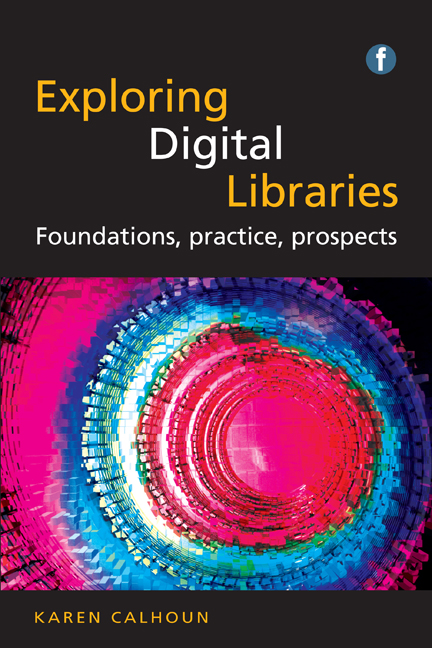Book contents
- Frontmatter
- Dedication
- Contents
- List of figures and tables
- Preface
- Acknowledgements
- Glossary
- 1 Emergence and definitions of digital libraries
- 2 Outcomes of digital libraries’ first decade
- 3 Key themes and challenges in digital libraries
- 4 Digital library collections: repositories
- 5 Hybrid libraries
- 6 Social roles of digital libraries
- 7 Digital libraries and their communities
- 8 The prospects of open access repositories
- 9 Digital libraries and the social web: scholarship
- 10 Digital libraries and the social web: collections and platforms
- References
- Index
4 - Digital library collections: repositories
Published online by Cambridge University Press: 08 June 2018
- Frontmatter
- Dedication
- Contents
- List of figures and tables
- Preface
- Acknowledgements
- Glossary
- 1 Emergence and definitions of digital libraries
- 2 Outcomes of digital libraries’ first decade
- 3 Key themes and challenges in digital libraries
- 4 Digital library collections: repositories
- 5 Hybrid libraries
- 6 Social roles of digital libraries
- 7 Digital libraries and their communities
- 8 The prospects of open access repositories
- 9 Digital libraries and the social web: scholarship
- 10 Digital libraries and the social web: collections and platforms
- References
- Index
Summary
Overview
This chapter and the next discuss digital libraries and the web through the lens of collections and collection building. This chapter begins with an exploration of the parallel but separate developments of the web, digital library repositories and hybrid libraries. It then turns to an examination of digital library repositories. Topics include numbers, usage and discover - ability of repositories; current position and roles; systems and software; federation and dissemination of repository content; next-generation repository systems; and cyberinfrastructure, data and e-research support. The next chapter moves on to the examination of hybrid libraries, then concludes with thoughts about advances, opportunities and challenges for both hybrid libraries and repositories.
The traditional library worldview
Over the course of the 19th and 20th centuries, conventional definitions of libraries and core assumptions of the general public have tended to emphasize their collections over their social roles. Services are sometimes mentioned, but the core assumptions are that libraries are collections of things (especially books) in fixed locations (buildings and later, online ‘virtual’ collections or repositories), and the role of libraries is to provide access and support for these collections on behalf of the communities they serve. In keeping with this set of core assumptions, library roles and services have tended to be defined through the collections lens: selecting, acquiring, organizing, preserving, managing, providing for access, answering questions and providing instruction about how to use collections. The result is that collections take center stage and dominate the current library worldview, or overall perspective from which people (including librarians) define libraries.
Carl Lagoze discusses the notion of library core assumptions as a ‘meme’ (a worldview) that has influenced digital library development. He contrasts the library meme with the web meme (2010, 48–71) and goes on to argue that over time, the library meme engendered digital library technical approaches and standards that did not play out well on the web as both the web and digital libraries evolved. Indeed, large-scale success for digital library researchers and practitioners has often depended on others being willing to adopt or accommodate digital library ways of doing things (as opposed to the ways things are typically done on the web).
- Type
- Chapter
- Information
- Exploring Digital LibrariesFoundations, Practice, Prospects, pp. 85 - 110Publisher: FacetPrint publication year: 2014



